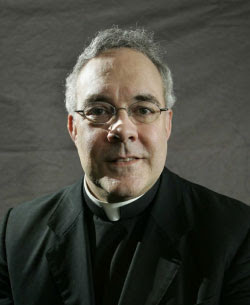Defending the Free Market: The Moral Case for a Free Economy by Rev. Robert Sirico
Published by Regnery in 2012
When I told two of my Catholic friends (who do not know each other) that I was reading a book about economics written by a Catholic priest, both reacted with a hearty laugh. Then, both commented about the political leanings of the priest, assuming that the priest would be quite liberal. Sadly, they were very surprised when I described some of the Rev. Sirico's thoughts.
Why sadly? It is sad that many people (not just Catholic priests) do not grasp the simple relationship between one's standing before God and one's rights - God has made you an individual and you are endowed with certain rights - as an individual. People are creative (as is the Creator), are intended for some sort of work and should have the freedom to find the work that pleases them and reap the benefit from what they have sown.
 |
| Reverend Robert Sirico |
Some arguments never even occurred to me before, such as the assertion that all foreign aid, even programs that send food and clothing to third world countries, hurt those countries more than they help (in the case of clothing, it discourages local clothing businesses from starting - who will buy a new shirt from a local manufacturer when they can wear your donated 5K run/walk fundraiser shirt for free? If that local manufacturer can't make any money, he can't hire someone to work in his factory or pay someone to supply him with cotton and the unemployment rate remains high).
Perhaps his most powerful comments run along the lines of the most basic of economic concepts - price indicates demand and when the government messes with price, it sends false signals to the market and causes major problems. Proper Capitalism is not cronyism (government making rules to benefit certain businesses in exchange for favors) because that also sends false signals to the market. Socialism sends lots and lots of false signals to the market and the longer those signals are sent, the worse the problems when the market re-sets. He also brings a very good point to the discussion of socialism - it drives some people out of the market entirely and puts the people in charge of the socialist apparatus in a powerful position to affect the market as they make rules that are not based on reality (think of the old USSR and the story of the shoe factories that made thousands of left shoes but no right ones - there should have been a market signal to make right shoes as well). Besides, a capitalist that gets rich making pairs of shoes has benefited society (even if he does get rich along the way), a socialist who makes nothing but left shoes has just squandered scarce resources.
He also makes arguments about the value of "smart" (local) charity vs. welfare, why "creative destruction" is a good thing in the economy, the health care system, environmentalism and finally ends with thoughts about theology and economics.
This is a profound little piece of economic writing. It challenges some common assumptions, it is easy to read and digest and well worth your time.
I rate this book 5 stars out of 5.
Reviewed on July 15, 2012.
This book can be found on Amazon.com here: Defending the Free Market: The Moral Case for a Free Economy










Comments
Post a Comment